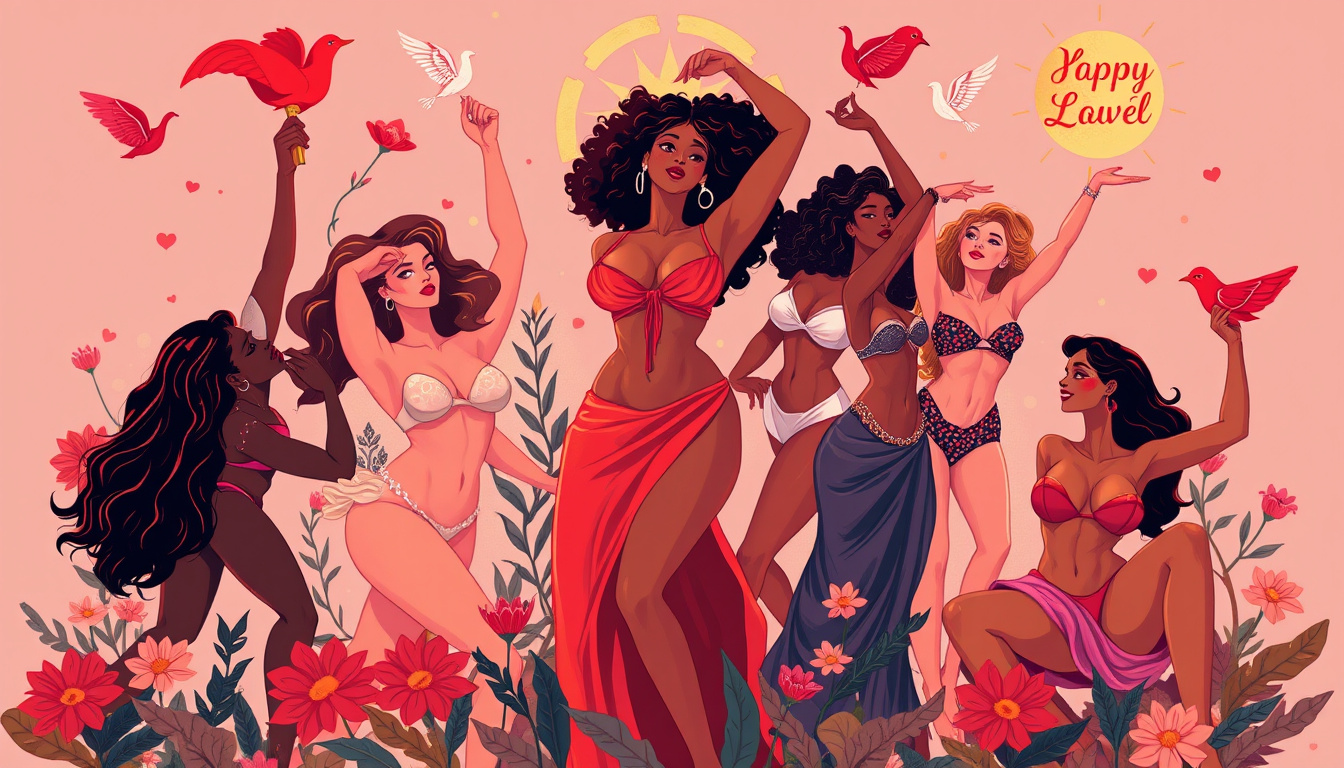Physical Address
304 North Cardinal St.
Dorchester Center, MA 02124
Physical Address
304 North Cardinal St.
Dorchester Center, MA 02124

Have you ever found yourself pondering a provocative question: Can you be a feminist and write erotica? It’s a query that stirs passion, curiosity, and perhaps a twinge of guilt in many of us who embrace the sensual side of storytelling while fiercely advocating for women’s rights and empowerment.
In a world where feminism celebrates choice and autonomy, the realm of erotic writing invites women to explore their desires and fantasies unapologetically.
Join me as we journey through the intriguing intersection of feminism and erotica, unpacking the key principles of feminist thought, demystifying the genre of erotica, and embracing the notion that you can absolutely embody both worlds.

## Understanding Feminism: Key Principles and Perspectives
Can you be a feminist and write erotica?
It’s a question that sparks curiosity and debate among many, especially in a world where women’s empowerment is at the forefront of cultural conversations.
To embrace your sensuality and express it through erotic storytelling can feel like a radical act of defiance against societal norms that often dictate how women should behave, dress, and communicate their desires.
At its core, feminism advocates for equality, autonomy, and the liberation of women from oppressive structures.
It challenges the narratives that confine women’s identity and experience.
So, how does erotic writing fit into this intricate tapestry?
Here are some key principles to consider:
• Agency: Feminism celebrates women’s autonomy over their bodies and choices.
Writing erotica allows women to reclaim their desires, exploring their sexuality on their own terms.
– Diversity: Feminism encourages the representation of diverse perspectives and experiences.
Erotica can embrace various voices, showcasing the unique desires and pleasures of individuals from all backgrounds.
– Empowerment: Writing and reading erotica can empower women by normalizing conversations around sex and pleasure, helping dismantle the stigma often associated with sexuality.
– Challenge Norms: Erotica can challenge traditional gender roles and sexual norms, presenting women as active participants in their sexual stories rather than passive objects.
For example, take the story of a woman discovering her sensuality through writing.
In her journey, she finds that crafting tales of desire not only liberates her own fantasies but also resonates deeply with her readers, who see their unspoken thoughts reflected in her narratives.
This is not merely the act of writing; it transforms into an act of activism—a declaration that women’s desires are valid and worthy of exploration.
So, yes, embracing your identity as a feminist does not preclude you from writing erotica; rather, it enriches the genre with multidimensional characters and authentic narratives that celebrate female empowerment.
As a feminist storyteller, you offer a joyous expression of sexuality that invites curiosity, embraces sensual exploration, and fosters confidence among your readers, encouraging them to celebrate their bodies and desires unapologetically.
### The Genre of Erotica: Definitions and Cultural Context
In today’s world, the question, ‘Can you be a feminist and write erotica?’ has become a stirring conversation among writers, readers, and activists alike.
The genre of erotica often gets pigeonholed into simply being about physical pleasure, but it is so much more than that.
To understand this intricate relationship between feminism and erotica, we must first define both terms.
Erotica is a literary genre that encompasses various forms of sexual expression, challenging the taboos surrounding desire and intimacy.
It’s not merely about lust; it invites readers into a realm of emotional complexity and personal empowerment, often unveiling the narrator’s inner world and sexual identity.
Similarly, feminism advocates for women’s rights, emphasizing equality, autonomy, and the empowerment of female voices.
Therefore, writing erotica can be an exhilarating act of feminist expression, allowing women to reclaim their narratives and showcase their sexual agency.
Some enlightening points to consider:
• Self-Exploration: Writing erotica can serve as a pathway for women to explore their desires and fantasies freely without societal judgment.
• Reclaiming the Narrative: Many female authors used this genre to shift the perspective from a male gaze to a celebration of female pleasure and empowerment.
• Cultural Shifts: The rise of diverse narratives in erotica reflects changing societal norms, aligning closely with feminist ideals that advocate for body positivity and sexual freedom.
Let’s take example authors such as Anaïs Nin, whose work captures the essence of feminine sensuality and explores the complexity of relationships in her storytelling.
Similarly, contemporary voices like E.L.
James have sparked dialogues around consent and sexual exploration—issues deeply interwoven with feminist discourse.
In summary, the intersection of feminism and erotica showcases the power of storytelling as a medium for self-discovery and empowerment.
So, can you be a feminist and write erotica?
Absolutely!
When approached with an intention of authenticity and depth, erotica becomes a meaningful exploration of the feminine experience.
‘The most common way people give up their power is by thinking they don’t have any.’ – Alice Walker

### Feminism in Erotica: Challenging Stereotypes and Empowering Voices
Can you be a feminist and write erotica?
This question may provoke a myriad of responses, often colored by societal beliefs that unfortunately still cling to the idea that women should either embrace their sexuality quietly or fight against the sexual objectification that has permeated our culture.
However, as we delve deeper into this compelling intersection of feminism and erotica, we find a rich tapestry of empowering narratives that defy the limited paradigms imposed upon female voices.
Erotica, traditionally viewed as taboo or even degrading, can serve as a bold platform for feminist expression.
The essence of feminism is about choice and agency, and this extends beautifully into the realm of writing.
Here are a few ways in which feminist erotica not only challenges stereotypes but also promotes a deeper understanding of sexual empowerment:
• Celebration of Female Desire: Through erotic storytelling, women can articulate their desires unapologetically.
This celebration of female sexuality rewrites narratives that often marginalize or misrepresent women’s experiences.
– Diverse Representations: Feminist erotica often showcases a range of sexual orientations and identities, dismantling the one-size-fits-all approach that has dominated mainstream narratives.
By highlighting diverse experiences, these stories reflect the multifaceted nature of womanhood and sexuality.
– Empowered Characters: Female protagonists in erotic stories are often positioned not as passive recipients of male gazes but as active participants in their sexual journeys.
This empowerment allows readers to see themselves as strong, vocal agents in their own sexual lives.
– Conversations Around Consent: Many feminist erotica pieces prioritize the concept of consent, encouraging dialogue around healthy boundaries and mutual respect.
These narratives empower women to claim their autonomy in intimate spaces.
Feminism and erotica are not mutually exclusive; rather, they can harmoniously coexist to create narratives that resonate with sensuality and strength.
By embracing this genre, writers can invite their readers — and themselves — to explore their sexual identities authentically and without shame.
So, can you be a feminist and write erotica?
Absolutely — it’s time to embrace the power of stories that electrify, empower, and heal.
### Balancing Personal Freedom and Feminist Values in Writing
When it comes to the age-old question, ‘Can you be a feminist and write erotica?’, the answer can be as nuanced and multifaceted as the women who are asking it.
For many, the exploration of sensuality and eroticism in literature can serve as a powerful platform for women’s empowerment.
It allows us to reclaim our bodies, desires, and narratives in ways that conventional storytelling often overlooks.
Here are some essential points to ponder as we navigate this provocative territory:
• Self-Expression: Writing erotica can be a form of self-expression that embraces female pleasure and desire without shame.
• Empowerment Through Choice: Choosing to write about erotic subjects positions women as active participants in their own stories rather than mere objects within them.
– Redefining Narratives: Erotica can challenge traditional gender roles and stereotypes by presenting women as complex characters with agency over their sexual experiences.
– Exploring Sexual Diversity: Writing in this genre allows for the exploration of sexual identity and the spectrum of desire, contributing to a more inclusive feminist discourse.
As you write, consider how your personal freedom intertwines with feminist values.
When you craft narratives that celebrate women’s autonomy, you’re fostering an environment where sensuality is not stigmatized, but celebrated.
By doing so, you’re answering the question affirmatively: yes, you can be a feminist and write erotica that resonates with the empowered and curious readers who crave authentic, passionate storytelling.
I write bold, emotionally charged romance and erotica where women face moral dilemmas, embrace desire, and come out empowered. Whether you’re here to explore sensual self-care, juicy writing tips, or just love a good tease, you’re in the right place.
💋 Craving more?
Explore Arizona’s full collection of spicy short stories and steamy novels right here.
Join the conversation
Leave a comment, share your thoughts, or subscribe to stay updated on new stories and saucy insights.